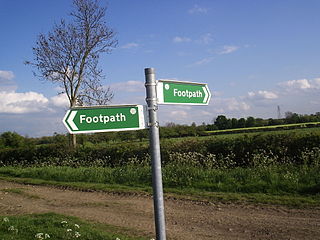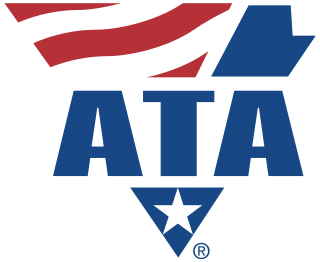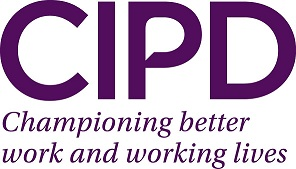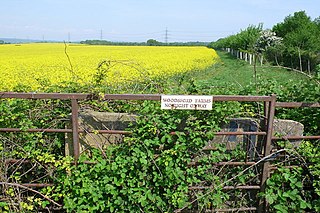
A board of directors is an executive committee that jointly supervise the activities of an organization, which can be either a for-profit or a nonprofit organization such as a business, nonprofit organization, or a government agency.

The Wildlife and Countryside Act 1981 is an Act of Parliament in the United Kingdom implemented to comply with European Council Directive 79/409/EEC on the conservation of wild birds. In short, the act gives protection to native species, controls the release of non-native species, enhances the protection of Sites of Special Scientific Interest and builds upon the rights of way rules in the National Parks and Access to the Countryside Act 1949. The Act is split into 4 parts covering 74 sections; it also includes 17 schedules.
A paralegal is the professional of legal science that performs procedures autonomously or semi autonomously, as part of a legal assistance system, and performs tasks that require understanding of the legislation for its proper execution. They also work in support or assist professionals related to the legal area of a consultative or judicial litigation nature. Its labor market is broad, including consultancies, companies that have legal departments or that perform legislation compliance activities such as: environmental, labor, controlled products, product registration, trademarks and patents, tax, bidding, among others. Legal offices and public bodies also have many paralegals in support activities although they do not yet use the correct name of the profession.
A homeowner association, or a homeowner community, is a private association-like entity often formed either ipso jure in a building with multiple owner-occupancies, or by a real estate developer for the purpose of marketing, managing, and selling homes and lots in a residential subdivision. In the United States, the developer will typically transfer control of the association to the homeowners after selling a predetermined number of lots. Generally any person who wants to buy a residence within the area of a homeowners association must become a member, and therefore must obey the governing documents including Articles of Incorporation, CC&Rs and By-Laws, which may limit the owner's choices in exterior design modifications. Homeowner associations are especially active in urban planning, zoning and land use, decisions that affect the pace of growth, the quality of life, the level of taxation and the value of land in the community. Most homeowner associations are incorporated, and are subject to state statutes that govern non-profit corporations and homeowner associations. State oversight of homeowner associations is minimal, and it varies from state to state. Some states, such as Florida and California, have a large body of HOA law. Other states, such as Massachusetts, have virtually no HOA law. Homeowners associations are commonly found in residential developments since the passage of the Davis–Stirling Common Interest Development Act in 1985.

In England and Wales, other than in the 12 Inner London boroughs and the City of London, the right of way is a legally protected right of the public to pass and re-pass on specific paths. The law in England and Wales differs from Scots law in that rights of way exist only where they are so designated, whereas in Scotland any route that meets certain conditions is defined as a right of way, and in addition, there is a general presumption of access to the countryside. Private rights of way or easements also exist.

A parking enforcement officer (PEO), traffic warden, parking inspector/parking officer, or civil enforcement officer is a member of a traffic control department or agency who issues tickets for parking violations. The term parking attendant is sometimes considered a synonym but sometimes used to refer to the different profession of parking lot attendant.

Chartered accountants were the first accountants to form a professional accounting body, initially established in Scotland in 1854. The Edinburgh Society of Accountants (1854), the Glasgow Institute of Accountants and Actuaries (1854) and the Aberdeen Society of Accountants (1867) were each granted a royal charter almost from their inception. The title is an internationally recognised professional designation; the certified public accountant designation is generally equivalent to it. Women were able to become chartered accountants only following the Sex Disqualification (Removal) Act 1919 after which, in 1920, Mary Harris Smith was recognised by the Institute of Chartered Accountants in England and Wales and became the first woman chartered accountant in the world.
In England, Wales and Northern Ireland, school governors are the overseers of a school. In state schools, they have three main functions:
Legal executives are a form of trained legal professional in certain jurisdictions. They often specialise in a particular area of law. The training that a Legal Executive undertakes usually includes both vocational training and academic qualifications.
A duty solicitor, duty counsel, or duty lawyer, is a solicitor whose services are available to a person either suspected of, or charged with, a criminal offence free of charge, if that person does not have access to a solicitor of their own and usually if it is judged by a means test that they cannot afford one. The system is operative in several Commonwealth countries, including the United Kingdom, Australia, New Zealand and Canada.
A highway authority is a government organization responsible for public roads.

The Institute of Public Accountants (IPA) is one of the three legally recognised professional bodies for accountants in Australia. The IPA represents more than 40,000 members and students working in industry, commerce, government, academia and professional practice.
Environmental Health Officers are responsible for carrying out measures for protecting public health, including administering and enforcing legislation related to environmental health and providing support to minimize health and safety hazards. Environmental Health Officers keep our water, food, air, land, facilities and other environmental factors safe of health hazards, whether biological, chemical or physical. They also address the related factors that impact behaviours. Environmental Health Officers assess and control environmental factors that can potentially affect health, to prevent disease and create health-supportive environments. Environmental determinants of health play a major role in a community’s overall health and well-being, and thus Environmental Health Officers are essential in improving population health outcomes and reducing the burden of disease.
The Solicitors Regulation Authority (SRA) is the regulatory body for solicitors in England and Wales.
Internal control, as defined by accounting and auditing, is a process for assuring of an organization's objectives in operational effectiveness and efficiency, reliable financial reporting, and compliance with laws, regulations and policies. A broad concept, internal control involves everything that controls risks to an organization.
A building control body is an organisation authorised to control building work that is subject to the Building Regulations in England and Wales (similar systems are provided in Northern Ireland, and in Scotland where the term 'building standards' is used. These regulations or standards are also known as building codes in other parts of the world.
In the United Kingdom, a Chartered Engineer is an engineer registered with the Engineering Council. Contemporary Chartered Engineers are degree-qualified and have gained the highest level of professional competencies through training and monitored professional practice experience. This is a peer-reviewed process. The formation process of a Chartered Engineer consists of obtaining an accredited Bachelor's degree with honours in engineering or technology, plus either an appropriate Master's degree or Engineering Doctorate (EngD) accredited by a professional engineering institution, or appropriate further learning to Master's level alongside a minimum of four years of professional post graduate peer reviewed experience and the ability to demonstrate fulfilment of various skills-based criteria. The title Chartered Engineer is protected by civil law and is a terminal qualification in engineering. The Engineering Council regulates professional engineering titles in the UK. With more than 180,000 registrants from many countries, designation as a Chartered Engineer is one of the most recognisable international engineering qualifications.

The American Trucking Associations (ATA), founded in 1933, is the largest national trade association for the trucking industry. ATA represents more than 37,000 members covering every type of motor carrier in the United States through a federation of other trucking groups, industry-related conferences, and its 50 affiliated state trucking associations. Former Governor of Kansas Bill Graves was replaced by Chris Spear as the ATA's President and CEO in July 2016.

The Chartered Institute of Personnel and Development (CIPD) is a professional association for human resource management professionals. It is headquartered in Wimbledon, London, England. The organisation was founded in 1913 - it is the world's oldest association in its field and has over 150,000 members internationally working across private, public and voluntary sectors. Peter Cheese was announced in June 2012 as CIPD's new CEO from July 2012.

Right of way is "the legal right, established by usage or grant, to pass along a specific route through grounds or property belonging to another", or "a path or thoroughfare subject to such a right". A similar right of access also exists on land held by a government, lands that are typically called public land, state land, or Crown land. When one person owns a piece of land that is bordered on all sides by lands owned by others, an easement may exist, or be created so as to initiate a right of way through the bordering land.








